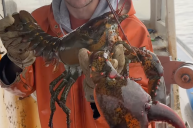Out of the frying pan and into the sea. A rare orange lobster ended up getting to go back home instead of getting broiled or baked. It's all thanks to the crustacean's unique color. It makes it a very rare catch.
People have nicknamed the orange lobster Clementine. While the nickname might be a bit on the nose, it's helped the animal avoided the dinner plates. It was originally found seafood section of a Stop & Shop in Southampton, New York. Now, Humane Long Island shared a post on Facebook that the lobster was going home.
This comes after the crustacean became a celebrity at the grocery store. Basically, it's almost like a Disney or Pixar movie. The store's manager had a young daughter. Said daughter befriended the lobster and named it Pinky. Management kept the lobster alive by feeding it shrimp. However, they tried to rehome the creature at a local aquarium. But they got shot down.
That's when Humane Long Island decided to help.
The organization wrote, "The store initially sought to spare her from the pot, reportedly offering a pardon at the Long Island aquarium, however, the aquarium apparently rebuffed her pardon, putting her back in harm's way but leaving the door open for Humane Long Island to learn of her plight and whisk her back to her ocean home."
Lobster Saved From Dinner Plates
It continued, "Humane Long Island's executive director reached out to Stop & Shop management who quickly agreed to donate the rare lobster for rehabilitation and release to the wild."
The organization rehabilitated the lobster with a cold water tank. They then dropped it off back into the ocean. They said, "Within hours, Clementine was swimming, foraging, and exploring the Long Island Sound, playfully following us around before disappearing into the ocean depths where she'll travel as far as 100 miles or more each year."
It was a pretty rare find. One in about 30 million in fact.
"Lobsters are sensitive, intelligent animals who can travel as far as 100 miles or more each year. Like all aquatic animals, lobsters will pain and suffer when taken from their ocean homes to be eaten or confined to cramped aquariums," John Di Leonardo, anthrozoologist and executive director of Humane Long Island, said in a statement.
"Humane Long Island urges everyone to celebrate Clementine's successful journey back to the wild by respecting all lobsters and not eating them, because no compassionate person should boil an animal alive," he added.




